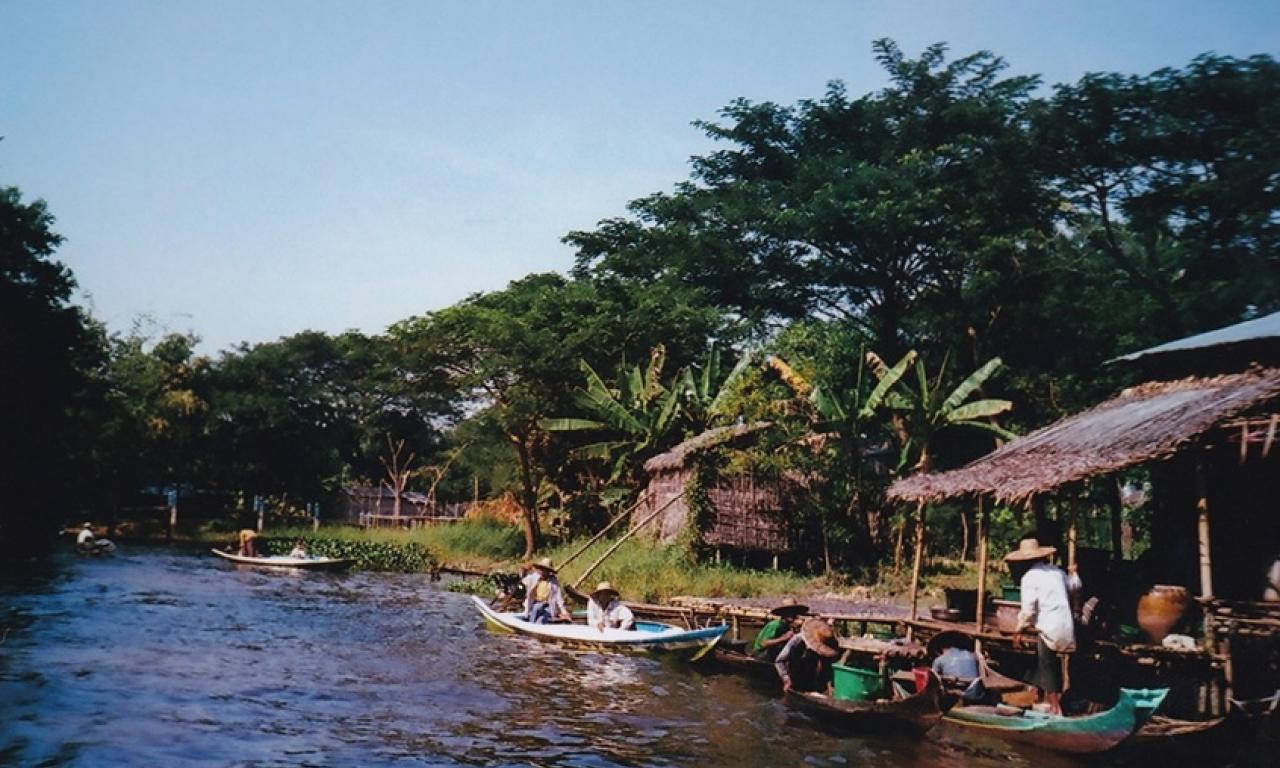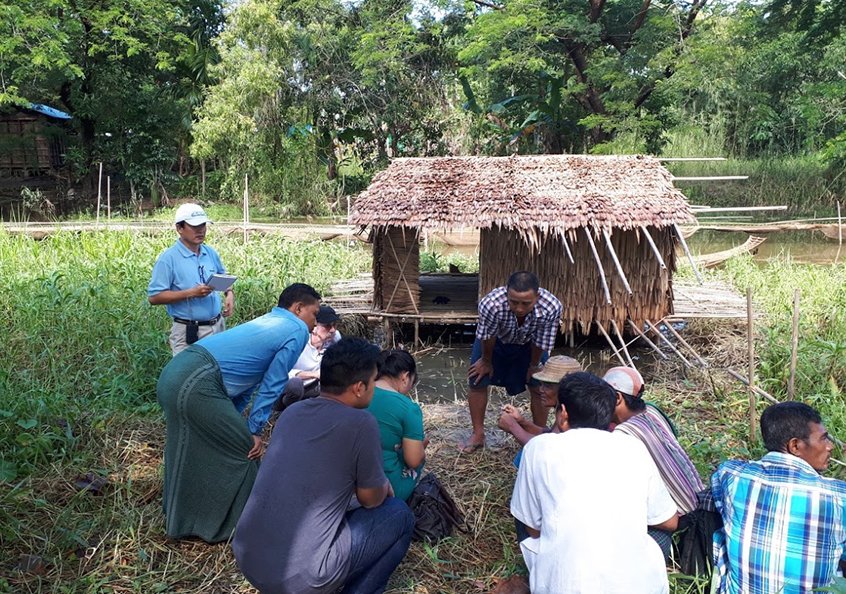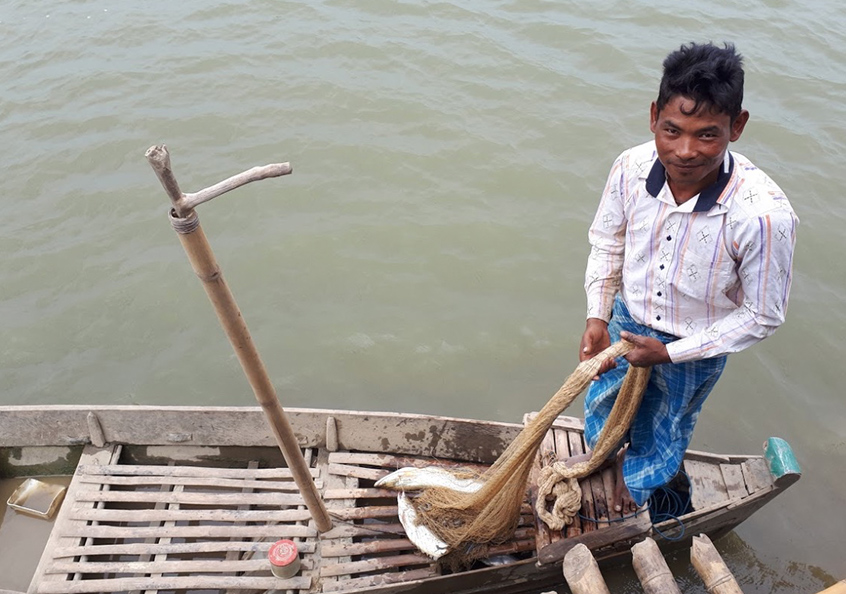
With an extraordinary diversity of ecosystems and fish species, Myanmar ranks among the top-ten fish producers globally. Yet, there is an acute dearth of information on the country’s fisheries. This is particularly inconsistent with the important role of fish for food and nutrition security, being second to rice in terms of food expenditure by Myanmar people.
Myanmar’s inland fisheries
With an extraordinary diversity of ecosystems and fish species, Myanmar ranks among the top-ten fish producers globally. Yet, there is an acute dearth of information on the country’s fisheries. This is particularly inconsistent with the important role of fish for food and nutrition security, being second to rice in terms of food expenditure by Myanmar people.
Traditionally, the extensive networks of rivers and floodplains have provided the bulk of fish for domestic consumption, but there are now growing concerns surrounding the access and use of these freshwater resources. These concerns are based on a long history of dispossession for fishing communities, largely imputable to the auction system that regulates access to the fisheries. This granting system, which can be traced back to the colonial administration in the 19th century, gives the usufruct rights of the most productive fisheries to the highest bidder on a yearly basis. Against an increasing privatization and commercialization of fishing access rights, the most vulnerable communities have been gradually losing access to their traditional fishing grounds. Recent evidence further suggests that the policy environment has encouraged the adoption of short-term strategies by license holders, often privileging productivity maximization over long-term sustainability.
Today Myanmar freshwater fisheries are at a crossroad with an unprecedented rate of political change and a local willingness to experiment with community-based management. Supported by NGOs, the government is pro-actively enacting regulations in that direction for the first time. Yet, many barriers remain to be overcome: There is a substantial knowledge gap around freshwater fisheries resources; an outdated and inadequate regulatory framework and a significant lack of local capacity with community-based approaches to natural resources management. Finally, there is an important level of resistance from powerful stakeholders who have a lot to lose in the process.
The MYFISH2 project
Known as MYFish 2, the ACIAR-funded “Improving Fishery Management in Support of Better Governance of Myanmar’s Inland and Delta Fisheries” project is co-implemented by WorldFish and the Department of Fisheries (DoF). The project aims at supporting the decentralization process toward more equitable and sustainable governance of freshwater fisheries in Myanmar.
In that context, the project is investigating and documenting existing management systems, gauging their actual benefits and limitations through consultations with resources users and government. Among the different management systems, the first Community-Based Fisheries Management (CBFM) initiatives setup in the context of the recent political reform are of central interest.
“CBFM can also lead to more destructive fishing practices, and then be less supportive of local livelihoods on the long term. All the challenge lies in identifying the right balance between productivity and sustainability” (Maubin township DOF officer)
To guide the reform, policy makers need a comprehensive understanding of what is meant by CBFM approach in the context of Myanmar. To do so, the project has put forward a typology and is conducting an important number of characterization studies across the Ayeyarwady Delta, the region comprising the most important fisheries in the country. By assessing their current performances and identifying entry points for improvement, MYFish 2 provides the very much-needed evidence to support the reform. In doing so, the project puts a strong emphasis on building local research capacity in the process.

Collaborative research framework
Central to MYFish 2 is the setup of a pioneering framework aimed at monitoring and evaluating the merits of different CBFM experimentations in Myanmar. The methodology builds on a daily biological monitoring protocol involving over 40 fishers together with a biannual socioeconomic surveys implemented over 1,000 households, both extending over 13 fisheries that have recently started to experiment with CBFM. In addition to the DoF and WorldFish, 5 local universities are working along with local communities themselves through participatory research methods.
This approach helps making the best of the local knowledge, while at the same time entirely grounding the research within local institutions. The monitoring framework has the particularity of being co-designed, co-implemented, and co-interpreted amongst the various research partners. The systematic data collection extends over a period of 2 years and conceptualizes performances of CBFM across three dimensions, namely social, economic, and biologic.
“The needs of local research is high in Myanmar, especially in these times of fast change. The foci of academic research in Myanmar are generally of limited interest for policymaking. With the support of ACIAR and WorldFish, we are glad to join hands with DoF and contribute to building knowledge that will be relevant for improving management of natural resources and the people who depend on them.” (Pathein University Head of research)
To be maintained over time, the MYFish 2 research is channeled through a multisectoral collaborative research network – the Fisheries research Development Network (FRDN)– administered by the DoF with the support of WorldFish and involving other major actors of the sector such as Myanmar universities and the private sector.
“Beyond the actual knowledge gaps being filled, the institutional legacy of the project is quite sizeable. This is the first time in more than 50 years that we see the Department of Fisheries working along with local universities and communities, entrusting their evidence to support policy decisions. I believe this is setting a precedent for participatory and collaborative research approaches in Myanmar.” (WorldFish Myanmar Research Coordinator)

Research framework
After nearly 2 years, the MYFish 2 project is already generating unique evidence in support of the ongoing political reform. In 2018, the research findings have accompanied an important political move towards the legal recognition of CBFM as a potential alternative to the auction system. Currently implemented on an experimental basis over just a few sites at the discretion of local authorities, fishing communities across the country have high hopes to get hold of the fish resources that have sustained their livelihoods over generation. Yet, aware of neighboring countries such as Cambodia where a similar transition has turned sour, policy makers hope that Myanmar will be able to avoid falling in the same pitfalls.
To do so, the MYFish 2 project is setting up the foundations of a highly inclusive monitoring system. If successful, the research framework could be scaled up and provide critical insights on some of the over 3,000 fisheries auctioned every year in the country. For the most part, these fisheries are not monitored, which makes it nearly impossible for policy makers to take informed decision. Central to the project is the conviction that it is only by empowering local actors that a right balance will be struck between the social, economic, and biological performances of freshwater fisheries in Myanmar and beyond.
About the authors

Romain Langeard is an agro-economist with over five years of international experiences in the field of fisheries, natural resources management and community development. Originally from France, he has previously worked in Southeast Asia, Africa and Central America. Now back in France, Romain works with Worldfish Myanmar since 2 years as a research consultant and project coordinator in the field of Small-scale fisheries development.

Xavier Tezzo is an agro-economist with over ten years of international experience in the field of fisheries and aquaculture. Originally from Belgium and Congo, he has previously lived and worked in Africa and Southeast Asia. Living in Myanmar for over 6 years, Xavier currently works as a program coordinator for WorldFish, coordinating research activities across various projects. Concurrently undertaking a social sciences PhD project with Wageningen University, his research focuses on the aquaculture transitions in Myanmar.